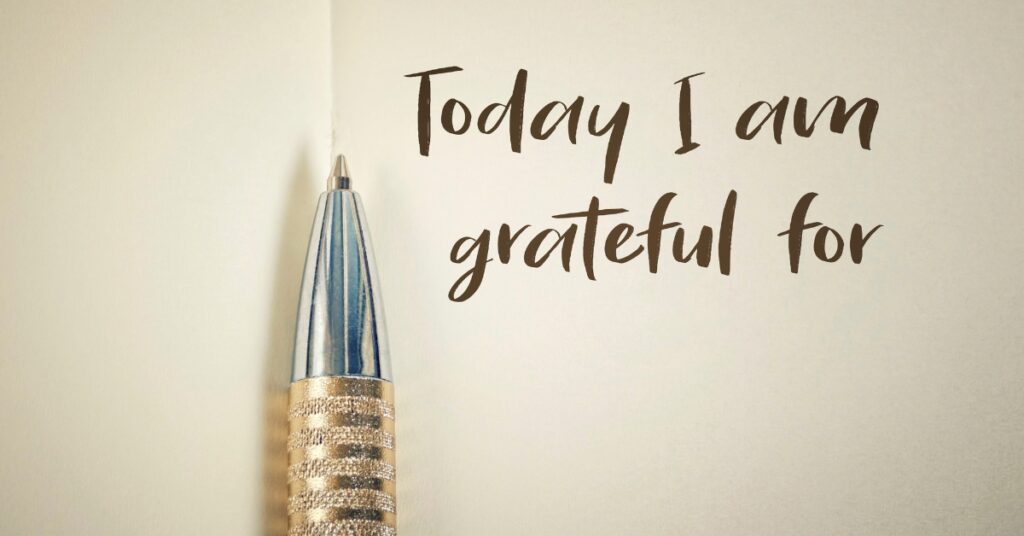The Science of Gratitude

Adopting an attitude of gratitude is not some new age, woo woo thing and it certainly doesn’t dismiss the struggles that life throws at us. There is hard research and science backing why practicing gratitude and filtering to see the good in situations (even the most challenging ones) is good for our mental and physical health long term.
How? I hear you ask. Yes, I can hear what you are thinking. Well let’s start by being grateful to Robert Emmons, Ph.D., the world’s leading expert on gratitude. This awesome guy has dedicated over 10 years to studying the effects gratitude has on us physically, psychologically, and socially. His team studied over 1,000 people from ages eight to 80 and found that people who practice gratitude consistently report many health benefits.
In an article for Greater Good, Emmons lists the proven physical, psychological, and social benefits of thinking grateful thoughts.
Physical
- Stronger immune systems
- Less bothered by aches and pains
- Lower blood pressure
- Exercise more and take better care of their health
- Sleep longer and feel more refreshed upon waking
Psychological
- Higher levels of positive emotions
- More alert, alive, and awake
- More joy and pleasure
- More optimism and happiness
Social
- More helpful, generous, and compassionate
- More forgiving
- More outgoing
- Feel less lonely and isolated
Imagine if by shifting your focus to notice – things you are grateful for, things you love, things you appreciate – leaves you feeling happier, enjoying life more, and lowering your stress and anxiety? Wouldn’t that be amazing! Well, here is the science behind how it can be done.
When we start changing the filter on our life through reframing and searching for a different meaning to things, events, people, and places, we start to program our brain differently. Our reticular activating system (RAS) in the brain is your internal scanning system responsible for scanning our environments, conversations, interactions and only bringing in information that aligns with our beliefs or what we are seeking into focus and disregarding all other information.
Have you ever been looking for a new car and then suddenly you start noticing the car you want to buy everywhere? That is the RAS. Why does it do this? We are sensory beings, and at any one time we are bombarded with over 14,000,000 bits of information! That is a lot to deal with and process, right? So, to prevent us from going into overload our RAS scans for what is “relevant” or “important” and leaves behind what is “irrelevant” or “unnecessary”.
Think about all the things you are potentially brushing over in life? Some of us have programmed our RAS to only look for drama, messiness, problems, financial issues, rejection, fault, etc. If you are always looking for things to be angry about, the RAS will only look for things for you to be angry about. If you are always looking for ways someone doesn’t love you, you will spot them and sometimes even distort them to fit your beliefs. If you are always looking for ways you are failing…you got it, you will filter things to make yourself out to be a “failure”. It will disregard any information that doesn’t align with what it has been programmed to look for. So, all the things to be grateful for or all the loving gestures someone offers you don’t get picked up by the filtering system and go unnoticed by you. Therefore, having an Attitude of Gratitude will help you start reprogramming your brain. Changing what your RAS is programmed to focus on and changing the filter you have on your circumstances will start changing how you view your life, opportunities, possibilities, and your attitude. Building a growth mindset and emotional maturity.
Imagine working with your body, strengthening your immune system, being able to move through your problems and challenges with a more positive attitude, attracting more clients and abundance to you, feeling more alive, more empowered!
Here is how to start! Over the next seven days, start training your brain to have an attitude of gratitude with these five simple and proven practices:
- When someone triggers you or you are faced with a challenge, write down something from this experience or person you are grateful for. We must be grateful for things that cause us the most discomfort because they reveal to us what is unhealed within us, or areas we need growth in.
Thank you for…
…revealing to me what is unhealed within me.
…giving me the opportunity to grow or be more present.
…showing me duality.
…showing me what I don’t want in my life or how I don’t want to treat people (or it reveals to you that there is some good in that person that you can now see)
- Start a gratitude journal by writing down three to five things you are grateful for each morning. This seriously changed my life when I started practicing gratitude. Wiring your brain to get into an attitude of gratitude simply starts with thinking about what you are grateful for each morning. This will start unconsciously shifting your state.
- Notice what you give out to the world. Think of how grateful you are for what you can give to others, your community. It might be that you have time to give others a smile, a hug, or you are grateful that you can buy a friend a coffee or donate to a worthy cause.
- Take a gratitude walk in nature or around your block (leave your phone at home). This can be quick if you are short on time (10 mins is plenty). As you walk become aware of your surroundings, really be present, immerse yourself in your environment, notice the flowers blooming, architecture of buildings, people passing. Note a few things that really caught your attention, or that you see as beautiful or special. It could be something that you pass everyday but never noticed before. I also do this in my car driving to work when stuck in traffic – I start stacking things to be grateful for instead of getting frustrated.
- Write a gratitude letter to someone from your past who helped you get where you are today. Like a teacher, mentor, parent, friend, employer. Anyone who has supported you. Send this letter to that person however you like (via email, text, mail). Research shows that being as specific as you can is important. So, elaborate on WHY you are grateful to them.
To truly reap the full benefits of gratitude, Emmon’s research recommends repeating these new gratitude practices at least three times each week for 30 days. Feel free to mix it up and incorporate your own too. But the key to cultivating an Attitude of Gratitude is making this a practice, a way of being! Gratitude is hiding everywhere when you practice and know how to look for it.

